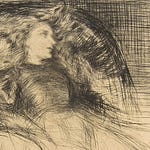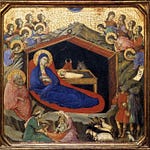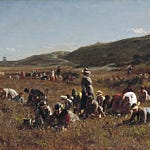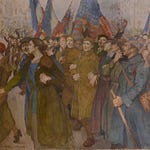In the Old Testament, in the Law that faithful Jews have lived by for three thousand years, we hear often that God takes special care for “the widow and the orphan,” our Word of the Week. That is because, if the rest of the family is far away or has died, there is no one else to care for them. We must always remember that everyone, or almost everyone, lived very close to the land, so that if you did not have a father or brothers with strong backs to keep the plow and the oxen straight as they furrowed a track in the earth, or to manhandle other large domestic animals that could often be as stubborn as they were dumb, or if you had small children to care for so that you had little time even to attempt something like that, you might go very hungry, very fast. The widow and the orphan were vulnerable. And of course, wherever you go in this world, you will meet people ready to take advantage of the weak, and even hug themselves for “helping” them while they do so. But here’s a verse I’m quite fond of, that takes just the opposite point of view: “When you gather the grapes in your vineyard, you shall not glean it afterward: it shall be for the stranger, for the fatherless, and for the widow.” The same goes for a sheaf of wheat you might forget in your field, or the olives left on the trees after you have beaten them once. You shall leave the rest of the pickings for the stranger, the orphan — the Hebrew word suggests loneliness — and the widow.
It’s what the rich man Boaz did when he saw Ruth — and here Keats’ brilliant lines come to mind, describing “the sad heart of Ruth when, sick for home, / She stood in tears amid the alien corn.” He told the young reapers in his employ that they should let Ruth glean among the sheaves, and not chide her about it, but even let fall some of their handfuls on purpose, “that she may glean them, and rebuke her not.” Boaz does this because he is a good and just man, and also because he knows how loyal and loving Ruth has been to her mother-in-law Naomi, even though Ruth is a woman of Moab and not of Israel. But Ruth would not let Naomi return to Israel in her lonely widowhood. “Wherever you go, I will go,” said Ruth, and “your people shall be my people, and your God my God.”
In the days before the sulfa drugs and then antibiotics, people died of infectious diseases, or of wounds in battle or injuries at work, or in childbirth, so that being an orphan wasn’t an uncommon thing. I could tell as much, when I was a kid, from reading the dates on the monuments in the old cemetery, behind our yard. The word orphan could describe a child with no parents at all, or a child without a father for sustenance and protection: hence the phrase “widows and orphans,” meaning widows without children, children without parents, and widows with their own children. The King James Bible usually translates the Hebrew word for orphan as fatherless, which is to bind the widows and their children most closely together. It was considered a tragedy, of course, if a child had to grow up without a mother or without a father. It would have been considered madness to choose such a condition arbitrarily or without grave cause, and unjust to the children. Nobody should have to be an “Orfling,” as Dickens shrewdly names a minor character in David Copperfield — with the diminutive suffix -ling suggesting helplessness and, in this context, lonesomeness.
The word orphan came into English from the Norman French, who got it from ecclesiastical Latin orphanus, whose churchmen got it right out of the Greek orphanos, meaning orphan in the strict sense, or fatherless, or destitute. You’d think that such an odd word, denoting an odd condition, would be a solitary thing, tucked away in a linguistic corner. But it wasn’t — again, because it wasn’t that odd. Sure, the Latin word descended into all the Romance languages more or less intact: Italian orfano, Spanish huerfano. But it already had cousins all over the Indo-European map, and they share some very important characteristics. Suppose your mother and father die, and you get taken into the family of a distant uncle. People being what they are, you might expect to do a lot of work: so that being fatherless or losing both your mother and your father means a young life of sweat and strain. That’s a sense that entered the word’s cousins in the Germanic and Slavic limbs of our tree. So we have German ARB-eit, work, and Old Czech ROB-ota, drudgery (from which, coined by the novelist Karel Capek, we get our word robot), and Anglo-Saxon earfoth, difficult, miserable. But we also get, in a more cheerful vein, German Erbe, Heir, and Anglo-Saxon ierfa, heir, and Icelandic arfr, inheritance. And sure enough, since faraway places tend to preserve old forms, we get the rare Scots English word erf, also meaning inheritance. So I can imagine a Highland Scot prodigal son in the old days, saying, “Faither, gie to me noo min erf” — words that a loving father never wants to hear! For it’s as if the son wishes he were an orphan already.
Word & Song by Anthony Esolen is an online magazine devoted to reclaiming the good, the beautiful, and the true. We publish six essays each week, on words, classic hymns, poems, films, and popular songs, as well a weekly podcast for paid subscribers, alternately Poetry Aloud or Anthony Esolen Speaks. Paid subscribers also receive audio-enhanced posts and on-demand access to our full archive, and may add their comments to our posts and discussions. To support this project, please join us as a free or paid subscriber. We value all of our subscribers, and we thank you for reading Word and Song!














